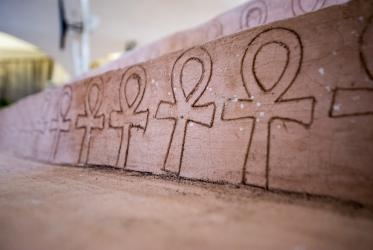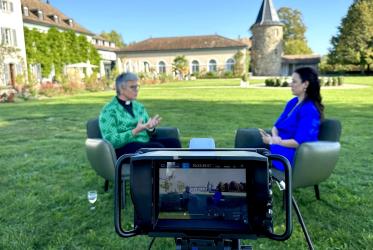Rev. Dr Konrad Raiser has been on an ecumenical journey for most of his adult life, which spans 80 years.
The former general secretary of the World Council of Churches (WCC) relates some of this pilgrimage in his newest publication, “The Challenge of Transformation: An Ecumenical Journey.”
On 5 February, shortly after Raiser’s birthday, ecumenical experts from different generations, confessions and continents met in Geneva to discuss the newest publication by the man who led the WCC from 1993 to 2003.
At an ecumenical prayer service ahead of the book presentation, Bishop Dr Staccato Powell, WCC Central Committee member for the African Methodist Episcopal Zion Church said, “With more than 340 member churches in Europe and North America, Africa, Asia, the Caribbean, Latin America, the Middle East and the Pacific there are bound to be some issues. (…) As believers in Christ, we must learn to practice true transparency. When we are able to be transparent with our issues, we can then be transformative in our impact!”
WCC general secretary Rev. Dr Olav Fykse Tveit introduced German theologian Raiser as a man who was born in 1938 and who celebrated his 80th birthday on 25 January.
50 years connected to the WCC
Tveit noted that of those very full years, “nearly 50 of them were connected to the life of the World Council of Churches in some way or another”.
“That is a unique opportunity for us in this 70th anniversary of the WCC to listen to a living source, but not only to listen to him but to read and share” his story, extolled Tveit.
Raiser said he has dedicated the book to Philip Potter who served as third WCC general secretary from 1972 to 1984 and under whom he had served as deputy general secretary, as one of his closest colleagues.
Following the presentation of the book by Raiser, the former general secretary conversed with the translator and editor of the English edition of his book, Dr Stephen Brown, who also edits The Ecumenical Review.
Panellists later picked themes from the final chapter of the book written for the English edition. In this chapter, Raiser focuses on the “pilgrimage of transformation” on which the WCC has embarked.
Brown asked Raiser why he had chosen the book title around transformation.
‘Journey in transformation’
“I realise as I look back on the journey which I describe in this book, [that] almost since my very first assignment as a young study secretary in Faith and Order…from this very first assignment, I was continuously involved in trying to struggle with responding to processes of change and transformation in the world around us; in the life of the churches and then as a consequence in the life of the World Council of Churches,” said Raiser.
“To turn those experiences of change from something that can be overwhelming, and that can be suffered, into something that becomes a constructive moment for transformation, into something new…change as an opportunity,” he said.
Raiser joined the WCC as a study secretary in 1969 in the Commission on Faith and Order, when he noted he was one of the younger people around.
In 1973, he was appointed WCC deputy general secretary, with responsibilities from 1979 as staff moderator of the Unit on Justice and Service.
“I believe that the perspective of the Pilgrimage of Justice and Peace can strengthen this relational understanding of the oikoumene,” Raiser writes in the final chapter.
He notes that the image of the pilgrimage was alluded to already in the closing words of Potter at the 1975 Nairobi assembly of the WCC and was prominent in discussions at the Fifth World Conference on Faith and Order at Santiago de Compostela in 1993.
‘Pilgrimage open-ended’
“The pilgrimage is thus a dynamic and open-ended concept. It is essentially about relationships with and among those who journey together. They come from different directions and meet each other at unexpected points, but all have left their secure places behind and are prepared to be transformed and renewed through the encounters,” writes Raiser.
Georges ‘Yorgo’ Lemopolous, who served as deputy to five WCC general secretaries in his own ecumenical journey, read some lines that he believed will “help us to better understand what one can find throughout Konrad’s memoirs”.
The word came from Dr Willem A. Visser’t Hooft, founding general secretary of the WCC in 1948, who spoke once about the future of the ecumenical movement and had observed that:
“The ecumenical journey is like Abraham’s journey, when God commanded him to leave his country, to go in the direction that God shows us; the direction of unity, but without knowing much except that God is asking us to do certain things today and may ask us to do certain other things tomorrow.”
The direction taken by the ecumenical movement -- and more specifically by the Council -- has always been “the direction of unity,” said Lemopolous. However, because of the changing ecclesial, ecumenical and political landscape, to fulfill its purpose, the Council has tried “to do things differently”.
He said the WCC is deeply indebted to Konrad Raiser for his legacy.
Dr Agnes Abuom, moderator of the WCC Central Committee, described it as a wonderful day to see some of the stalwarts of the ecumenical movement present and said she wanted to contextualize some of the points in Raiser’s last chapter and look forward.
“Justice and peace have been central motifs in the WCC and the ecumenical movement,” the Kenyan ecumenist noted.
She also rued that perhaps after the urban-rural programme of the WCC, “We have somewhat not fully engaged with the working class.
“And this is because the labour situation has transformed radically. We have turned away from secure labour and employer relationships to casual labour, undermining the rights and security of workers,” she explained.
Abuom invited the WCC to look at the changing landscape of labour and labourers saying she would like to bring to its centre this subject and the talk of “migrant labour and trafficking of human lives”.
For more information about the WCC 70th anniversary: www.oikoumene.org/wcc70
More information on “The Challenge of Transformation: An Ecumenical Journey”







